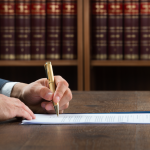Asylum Seeker Rights: An Interview with NZ MP Golriz Ghahraman

The 600 asylum seekers the Australian government is continuing to hold on Manus Island are now staying in transit centres in Lorengau. The facilities aren’t fully complete. There’s insufficient room to accommodate them all. And there’s a lack of water.
The final 328 asylum seekers, who remained within the now defunct detention centre, were forcibly removed two weeks ago. Most of them had been confined there since 2013. Meanwhile the Turnbull government refuses to even consider bringing these people to Australian shores.
Denying asylum
Sixty of the asylum seekers are to be sent to Port Moresby next week to be interviewed about the prospect of resettlement in the United States. And there are plans for more of the men to undergo the same process in the coming months.
The US resettlement deal was arranged over a year ago with the Obama administration. But now that Trump’s travel ban has recently been enforced, there’s contention as to whether all the men will be eligible to go, as many are from the countries the US is refusing to issue visas to.
Last month, New Zealand prime minister Jacinda Ardern offered to resettle 150 of the asylum seekers in her country. However, Malcolm Turnbull flat out refused the offer, stating that it would encourage more boats to arrive in Australian waters.
The Pacific Solution
It’s not the first time New Zealand has made such an offer. In 2001, then NZ prime minister Helen Clark offered to take 150 refugees that Australia was refusing asylum to. At that time, the Howard government accepted the offer.
The refugees that were resettled in New Zealand were from a group of 433 asylum seekers from Afghanistan. They’d been rescued by a Norwegian container ship, the MV Tampa, as they were stranded in a fishing boat in the Indian Ocean.
When the ship entered Australian waters off Christmas Island, the government ordered special forces to board it. Most of the people on board were eventually taken to Nauru. And thus began the Pacific Solution: the policy of detaining asylum seekers in offshore detention centres.
A human rights veteran
Recently elected NZ Green MP Golriz Ghahraman was interning at Amnesty International during the Tampa Crisis. She recently told the Guardian that at the time, New Zealand showed “our solidarity with refugees and our lack of prejudice.”
In October, Ms Ghahraman became New Zealand’s first refugee MP. Her family fled post-revolution Iran, when she was just 9 years old. They sought asylum after arriving at Auckland airport on a plane from Malaysia.
But, Ms Ghahraman warns that while NZ’s policy towards refugees is still sound in comparison to Australia’s, it’s eroded over time. In 2009, the former Key government enacted ban on Middle Eastern and African refugees without family ties being admitted into the country.
Sydney Criminal Lawyers® spoke with Golriz Ghahraman, a human rights and criminal defence barrister, about the Turnbull government’s refusal to accept the NZ refugee offer, anti-Muslim sentiment in her country, and the effect the nation’s bill of rights has for its citizens.
Firstly, Golriz, Jacinda Ardern offered to take in 150 of the asylum seekers Australia is holding on Manus Island. However, Malcolm Turnbull refused the offer.
What do you think about the Australian prime minister’s refusal to accept this offer?
It’s not a surprise. His approach to these asylum seekers and refugees has been cruel and inhumane, so it’s continuing on that.
We’re not experiencing Australia’s domestic politics, so it’s really hard to know. But, it feels like it’s much more to do with political gaming, then it is to do with Australia’s actual obligations to these people.
He said he’s trying to deter people from getting on boats. In reality, the majority of these people are actually refugees, escaping persecution and war.
Deterring them will mean creating circumstances that are more horrific than war and persecution. So, if that’s what he’s trying to do, it’s not exactly what he’s entitled to do. It’s not exactly legal.
That’s what it looks like from the outside: that Australia’s essentially committing crimes worse than persecution and war in order to deter people. And that has much more to do with internal politics, and him looking strong to his base, than anything else.
The Australian government is constantly stating that these men can return to their countries of origin. However, these people risked their lives on boats to flee their countries.
As you fled Iran with your family when you were younger, how do you react when you hear politicians suggesting that asylum seekers simply return to their countries of origin?
We had a similar situation in New Zealand in 2002, with an Algerian asylum seeker, Ahmed Zaoui. It became very high-profile. This was the constant argument then.
He was detained in New Zealand, whilst our refugee authorities processed him, and found him to be a genuine refugee from Algeria escaping political persecution. People kept saying in the media that it was a three-walled cell, because he could just leave.
While we were debating whether it’s OK to hold someone without trial just on a security risk, people kept saying, “Well, he can go back to Algeria.” But, he couldn’t. It’s a complete fiction.
If you are a refugee, you have escaped something akin to torture and persecution – really serious harm for your political beliefs, race, ethnicity, or religion. It is a complete fiction to say that you can go back to your own country.
Yes, you can go back and face that torture, or be executed. Some of these people will be members of the Rainbow Community escaping something like ISIS. Yes, you can go back and be thrown off a roof. And we’ve seen what happens there.
So, that’s not true.
You want to see New Zealand expand its refugee quota. And you also want to see the lifting of the nation’s ban on Middle Eastern and African refugees without family ties being admitted into the country.
Can you tell us a bit about why this ban is in place? And how likely you think it is that it will be lifted now that the country’s had a change of government?
It’s hard to know exactly why the ban is in place, without it referring to prejudice essentially – whether that’s race-based or religious-based.
Some of the reasons the previous government have given for the ban have been to do with the cost of getting people here from places like Africa or the Middle East. That’s very weird, because the distinction is if you’re in Afghanistan you don’t qualify. But, if you’re in Pakistan, you do qualify, because Pakistan suddenly becomes Asia.
It’s a very arbitrary ban. And it seems to be aimed at minimising the numbers of refugees that come from perceived to be Muslim countries, or African countries.
Last time I looked at the stats for 2016, we’ve only had four people from Africa. And that’s where the greatest need is.
If we’re honest with ourselves and say the refugee intake is about the greatest need, then we would take UNHCR advice on where there is the greatest need, and that is the Middle East and Africa. It seems to be a very nonsensical ban.
In terms of the chance of removing it, we are very hopeful. This government has always said it is going to be a government of compassion, and evidence-based policy. So, we’ll have those conversations, and it may well be that we change that policy.
There’s been a rise in Islamophobic incidents in Australia over recent years. During your election campaign, you were subjected to a barrage of social media abuse because of your Iranian heritage.
Has there been a rise in anti-Muslim sentiment in NZ recently?
It’s hard to know. It’s not true to say New Zealand is immune from this sort of thing. And it is always around.
But, with the rise of social media, and the comments section of news articles, it becomes easier for people to voice these kinds of prejudices, whereas, I’m not so sure that we’re experiencing an increased amount of prejudice out on the street.
We always experienced it, those of us from migrant backgrounds. So, here people from East Asian backgrounds get the most targeting. You get crimes committed against them. That’s always been going on.
But, online there was a mass of it when I first ran. And I don’t think the people around me were quite aware that the sentiment existed in New Zealand. But, I knew.
The British established a treaty with the Maori people, when they arrived in New Zealand. How have First Nations peoples fared under the treaty?
We’ve been told for generations that something like 200,000 Maori at the time ceded sovereignty to a handful of English people.
They’ve been fighting that reading of the treaty up until 2014, when our Waitangi Tribunal – the tribunal that is entrusted with settling claims to do with the treaty – said that it was just not true. They hadn’t ceded sovereignty.
The treaty is supposed to be an ongoing relationship between Maori and the Crown. And it’s never really been treated that way. We need to start to do that. It needs to be an ongoing thing.
But, if you look at New Zealand, Maoris have got the worst indicators when it comes to health, education, housing, any kind of social justice area. So, we really have been breaching the treaty.
And we’re only just starting to wake up to that and doing things like protecting the Maori language, and bringing Maori culture into our policy areas. Not just Maori affairs, but justice, health, and education. It’s something that we need to do to uphold that treaty.
It probably will become much more useful under governments who are actually committed to treating it like a constitutional document, rather than just a ceding of sovereignty that happened sometime in the past.
The New Zealand Bill of Rights Act was passed in 1990. It sets out the rights and fundamental freedoms of all New Zealand citizens. In Australia, we don’t have such a bill at the federal level, or in most states.
What sort of effect would you say having legislation that protects basic rights under the law has done for the citizens of New Zealand?
Where I’ve mostly gotten to really interact and apply the Bill of Rights Act has been in the criminal justice system. When you’re acting for a person accused of crimes, or when you are acting to uphold their rights in any other ways, it’s a very useful document.
So, we can say, “You can’t arbitrarily arrest or search people.” All that basic stuff goes back to our bill of rights.
The reality is that our Bill of Rights Act only enshrines civil and political rights. It doesn’t really go into economic and social rights. But, more than that, it’s not an enshrined document, so the government can explicitly pass legislation to breach it.
What would really help us is if we had constitutional protections around our bill of rights, like the Americans do, where we could strike down law that breaches it.
That’s a conversation New Zealand needs to start having. It’s not quite enough just to have ordinary legislation that can then be breached.
You’re advocating for the legalisation of recreational marijuana. The new prime minister has said that a referendum will be held on the issue.
What’s the climate like in New Zealand for cannabis legalisation?
New Zealanders understand this isn’t something we need to spend all this money on criminalising and punishing people for. If someone does have a problem with cannabis use, it needs to be treated like a health issue.
We need to invest that money into our healthcare system, so that a person can actually get treatment and move forward, rather than criminalising all sorts of people, and all sorts of communities.
Spending more on the healthcare system, where people can actually come forward and say that they, or their family member, has a problem, and can they get some treatment or support. That’s much more beneficial.
For generations now, we’ve understood that. But, the laws are lagging behind.
And lastly, what other pressing issues will be a focus for you over the coming term in parliament?
My personal portfolios are justice, electoral reform, foreign affairs and defence. My human rights focus has always been on child rights. So, I would like us to start to bring a children’s rights lens to our law making.
I want us to look at something like housing and say this is a right. People don’t have to prove that they are good, moral or successful to have these basic rights. To lift the sanctions on the poor, so that we actually do say, “No. These are obligations. We need to take care of our kids and their families.”
We need to provide education, jobs and housing as a matter of rights. So, it’s that lens that I’d like to bring to our policy making.
Golriz, thanks very much for taking the time out to speak with us today.
No problem. Thank you.







